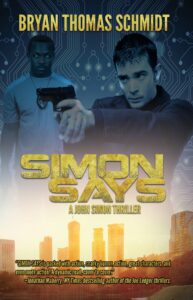 One way to be sure your manuscript is ready to submit is to make sure you get a good developmental edit. Now unless you’re making a lot of money already, paying someone may be out of the question. Most submissions editors will reject anything that’s not at least ninety percent there. They do line edits, proofing and fact checks, not developmental edits. So the onus is on you. If you’re like me, being close to your work, can prevent you from not only knowing what questions to ask but having the objectivity needed to view your work well. Some sort of guide would make a big difference.
One way to be sure your manuscript is ready to submit is to make sure you get a good developmental edit. Now unless you’re making a lot of money already, paying someone may be out of the question. Most submissions editors will reject anything that’s not at least ninety percent there. They do line edits, proofing and fact checks, not developmental edits. So the onus is on you. If you’re like me, being close to your work, can prevent you from not only knowing what questions to ask but having the objectivity needed to view your work well. Some sort of guide would make a big difference.
In her Editing Basics class, Author-Editor Cat Rambo (Fantasy Magazine) offers the following checklist for doing a good multi-pass Developmental Edit yourself. Cat suggests a multi-pass approach to allow yourself to address various aspects one at a time instead of trying to catch-all in one pass. The checklist is broken out by pass type. But before you begin the checklist, ask yourself the following questions:
1) What works and what doesn’t overall? (Make a list)
2) What is the story? Can you sum it up in a few sentences? If not, there’s a problem.
3) Look at the first and last page. Do they hook the readers in 13 lines or less? Does the story end strong?
Once you’ve addressed these basics, you’re ready for the more detailed Developmental edits. Be sure and ask questions down to a scene level, not just about the whole manuscript.
Character Pass:
1) Are the characters likeable?
2) Are the characters acting or reacting?
3) Can readers identify with the characters?
4) Does the reader know what the character wants?
5) Are there too many characters? Can any be combined?
6) What are the missed opportunities?
7) Where don’t we understand what the character is doing?
8 ) Where can we go deeper into the character’s head?
9) Is the dialogue interesting and informative of character?
10) Can the reader put themselves inside the story?
Story Pass:
1) Is the ending set up in a satisfying way? Is it the result of character actions?
2) Does the story make sense or are pieces missing?
3) How does the story move? (Is pacing good?)
4) Should pieces be removed? (And what should be done with them?)
5) What are the secondary story lines and are they delivered on?
World Pass:
1) Is the world clear?
2) Does it feel generic? (Is it?)
3) Does it make sense?
4) How important is the science of it?
5) Where should we know more?
6) Are the facts right? (Light fact-checking)
7) Where can the world come forward more?
8 ) How are things ordered? Point A to Point B? Or more like Momento or Pulp Fiction?
9) How hard does it make things for the reader and is the effect achieved worth it? (Because if it’s not there for effect, it’s pointless.)
10) How can it be improved overall?
11) Are the conventions consistent?
12) Where are the info dumps and what strategies surround them?
Chapter Level:
1) Do the chapters make sense structurally?
2) Does something happen over the course of each chapter?
3) Does the POV change over the course of the chapter? (Should it?)
4) Is the Prologue or Epilogue necessary?
5) Is head hopping an issue?
6) How do you make the book match conventions?
Making these four Developmental Editing passes enables you to focus on specific aspects of your manuscript and strengthen them each in turn. You can be sure you’ll cover other aspects in other passes and thus free yourself to really focus in. I hope this helps you improve your editing strategies not just for your own work but in helping others. What are the questions and approaches you use to self-edit? I’d love to have you share them in comments. And if the checklist still isn’t enough, consider taking one of Cat’s fine classes. They are well worth the money and the time.
For what it’s worth…
 John Barth described Cat Rambo’s writings as “works of urban mythopoeia” — her stories take place in a universe where chickens aid the lovelorn, Death is just another face on the train, and Bigfoot gives interviews to the media on a daily basis. She has worked as a programmer-writer for Microsoft and a Tarot card reader, professions which, she claims, both involve a certain combination of technical knowledge and willingness to go with the flow. In 2005 she attended the Clarion West Writers’ Workshop. Among the places in which her stories have appeared are ASIMOV’S, WEIRD TALES, CLARKESWORLD, and STRANGE HORIZONS, and her work has consistently garnered mentions and appearances in year’s best of anthologies. Her collection, EYES LIKE SKY AND COAL AND MOONLIGHT was an Endeavour Award finalist in 2010 and followed her collaboration with Jeff VanderMeer, THE SURGEON’S TALE AND OTHER STORIES.
John Barth described Cat Rambo’s writings as “works of urban mythopoeia” — her stories take place in a universe where chickens aid the lovelorn, Death is just another face on the train, and Bigfoot gives interviews to the media on a daily basis. She has worked as a programmer-writer for Microsoft and a Tarot card reader, professions which, she claims, both involve a certain combination of technical knowledge and willingness to go with the flow. In 2005 she attended the Clarion West Writers’ Workshop. Among the places in which her stories have appeared are ASIMOV’S, WEIRD TALES, CLARKESWORLD, and STRANGE HORIZONS, and her work has consistently garnered mentions and appearances in year’s best of anthologies. Her collection, EYES LIKE SKY AND COAL AND MOONLIGHT was an Endeavour Award finalist in 2010 and followed her collaboration with Jeff VanderMeer, THE SURGEON’S TALE AND OTHER STORIES.
She has edited anthologies as well as critically-acclaimed Fantasy Magazine, is a board member of feminist science fiction group Broad Universe, a member of the Codex Writers’ Group, and volunteers with Clarion West.
Although no longer actively involved with the game, she is one of the minds behindArmageddon MUD, the oldest roleplay-intensive MUD (an interactive text-based game) on the Internet, which has been described as “like no other mud I have played before“, “the most entertaining game I’ve ever played“, “the most creative, emotionally involved mud on the Net” and “a place of astonishing beauty and detail“. She continues to do some game writing as well as technology journalism and reviews for Publishers Weekly.
 Bryan Thomas Schmidt is the Hugo-nominated, national bestselling author of the space opera novel The Worker Prince, a Barnes & Noble Best SF Releases of 2011 Honorable Mention, the collection The North Star Serial, Part 1, and has had several short stories in anthologies and magazines, including official entries in The X-Files, Predator, Joe Ledger, and Monster Hunter International. His fourth novel, Simon Says, is a pulse-pounding near future thriller about a tough macho Kansas City detective with a dislike of technology who must team with an android witness to find his missing partner. His forthcoming novel, Shortcut, has been sold to Roserock Films for development as a motion picture. He can be found online as @BryanThomasS on Twitter or via his website. Excerpts from The Worker Prince can be found on his blog. Bryan is an affiliate member of the SFWA.
Bryan Thomas Schmidt is the Hugo-nominated, national bestselling author of the space opera novel The Worker Prince, a Barnes & Noble Best SF Releases of 2011 Honorable Mention, the collection The North Star Serial, Part 1, and has had several short stories in anthologies and magazines, including official entries in The X-Files, Predator, Joe Ledger, and Monster Hunter International. His fourth novel, Simon Says, is a pulse-pounding near future thriller about a tough macho Kansas City detective with a dislike of technology who must team with an android witness to find his missing partner. His forthcoming novel, Shortcut, has been sold to Roserock Films for development as a motion picture. He can be found online as @BryanThomasS on Twitter or via his website. Excerpts from The Worker Prince can be found on his blog. Bryan is an affiliate member of the SFWA.

